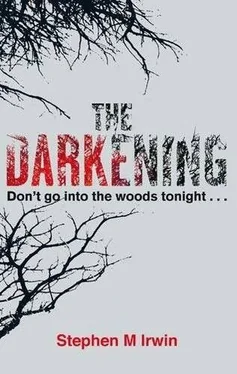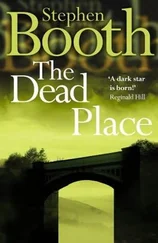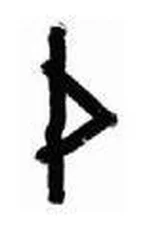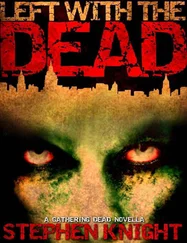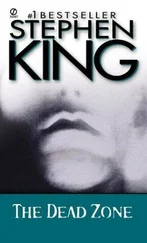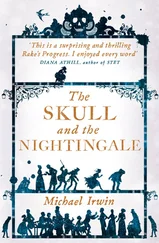Stephen Irwin - The Dead Path
Здесь есть возможность читать онлайн «Stephen Irwin - The Dead Path» весь текст электронной книги совершенно бесплатно (целиком полную версию без сокращений). В некоторых случаях можно слушать аудио, скачать через торрент в формате fb2 и присутствует краткое содержание. Жанр: Триллер, на английском языке. Описание произведения, (предисловие) а так же отзывы посетителей доступны на портале библиотеки ЛибКат.
- Название:The Dead Path
- Автор:
- Жанр:
- Год:неизвестен
- ISBN:нет данных
- Рейтинг книги:5 / 5. Голосов: 1
-
Избранное:Добавить в избранное
- Отзывы:
-
Ваша оценка:
- 100
- 1
- 2
- 3
- 4
- 5
The Dead Path: краткое содержание, описание и аннотация
Предлагаем к чтению аннотацию, описание, краткое содержание или предисловие (зависит от того, что написал сам автор книги «The Dead Path»). Если вы не нашли необходимую информацию о книге — напишите в комментариях, мы постараемся отыскать её.
The Dead Path — читать онлайн бесплатно полную книгу (весь текст) целиком
Ниже представлен текст книги, разбитый по страницам. Система сохранения места последней прочитанной страницы, позволяет с удобством читать онлайн бесплатно книгу «The Dead Path», без необходимости каждый раз заново искать на чём Вы остановились. Поставьте закладку, и сможете в любой момент перейти на страницу, на которой закончили чтение.
Интервал:
Закладка:
She was finishing the sweet, milky dregs when Suzette shuffled into the kitchen. Katharine nodded at the saucepan on the stove. Suzette nodded, too, and pulled back her hair. Katharine felt the twin forks of pride and jealousy: pride that she had brought such a confident, good-looking person into the world, and an instinctive, primordial antagonism to another female in her space. A younger one at that.
“Your brother’s sick.”
Suzette yawned and poured tea. “I’m not surprised.”
To take the bait and ask, “What do you mean?” was to give weight to this foolishness, and she would not be party to that. Instead, Katharine pushed her cup towards Suzette’s, and her daughter refreshed it. “Ta,” she said.
For a while, they sat in silence. It was Suzette who broke it.
“Do you remember Mrs. Quill down the road, Mum?”
“Beg pardon?”
“The seamstress at Jay Jay’s? Nicky and I walked by it yesterday.”
Katharine felt her bladder go as loose as a hung bedsheet in the wind. It took all her concentration to clench and hold. Her expression didn’t change.
“Quill? Not really. She must be dead years now. Do you need something mended?”
She saw Suzette’s eyes rise and lock onto hers.
She knows I’m lying.
But still the iron spike inside her refused to bend, and she met her daughter’s stare.
“No,” replied Suzette. “Never mind.”
T he painted clapboard sides of the garage were once white but decades of grinding sun and mindless rain had grubbied them to a weary gray that was flaking off dispiritedly, revealing tiny continents of bilious green undercoat. Its single window of four dusty panes stared darkly out at the lush garden that flanked the building. Lush monstera bushes with their broad, perforated leaves squatted around the outside, and Rangoon creeper snaked up the jagged timbers. The unused driveway, twin rails of concrete veined with cracks from which emerged tiny lava flows of moss, ran up to two wooden bifold doors that sagged, their tops meeting in the middle like the leaning foreheads of exhausted, clinching boxers. Nicholas slipped an old nickel-plated key into the lock of the right-hand bifold. It gave a desiccated groan as he drew it open.
He stepped inside and closed the door behind him.
Inside was dark and cold. There was no electric bulb. Thin, milky light trickled through the grime-fogged window.
Something was rattling. No wind shook the gray glass; the dust motes hardly stirred. He realized the sound was his teeth. He bit down hard to stop them.
He inhaled. The taste of the still air was tinted with engine oil, with the scent of earth as fine and barren as desert sand, with dry rot… and underneath it all, as faint as a whisper, the sickly aroma of rum. Katharine had cleaned out the bottles after she kicked her husband out, but the smell of the booze lingered like a slow cancer. He walked across to the bench and pulled open the drawer. It wouldn’t have surprised him to find half a dozen of the two hundred milliliter bottles his father preferred-but the drawer was empty except for dust and cockroach shells. He closed it.
It had been decades since he’d stood in here; yet the sight and smell of it had not changed. Time meant nothing. The thought sank like a slow blade into his gut. Those intervening years had been worthless. Twenty years of heartbeats, of travel, of conversations and work and sleep and wishes and laughter were dust. Cate had lived and died, and now existed only in his mind and in some cruel lantern show in the bathroom of a small flat in Ealing. This building was as much a crypt as any stone chamber in Newham Cemetery. Time was interred here.
He was tempted to step back out, return to bed and pray that his chill was something grave like pneumonia or dengue fever. Yet he knew he had to stay. He had an inkling. Something in here was waiting to be found.
His eyes were adjusting to the gloom. He craned his head back.
Between the trusses overhead were strung side by side two old wood painter’s planks, each thick as his wrist and gray with age, spattered with a muted rainbow of paints that had dried before Nixon resigned. Stacked on the planks were his father’s suitcases.
Suzette had looked through them, but he’d never so much as touched them. To open them would have meant that Donald Close truly was dead, truly was never coming home.
Leaning against the rear wall was a timber stepladder, also speckled with paint. Loops of gritty cobweb hung between the treads like hammocks in a sunken ship. Nicholas drew in a deep breath-the effort set him shaking harder-and blew what dust he could off the ladder and pulled it from the wall. He set it below the planks, and climbed.
His head drew level with the first suitcase; inches from his face, a spider the size of a coaster hung from the plastic handle. He instinctively jumped back, and only stopped himself falling by grabbing the red hardwood truss. A splinter drove deep into the soft web of flesh between his finger and thumb. He steadied himself. The spider bobbed in the disturbed air, light as tissue. It was a carapace, hanging empty by a silk thread. Nicholas felt his heart fluttering like a trapped sparrow; he flicked the spider shell away and started carrying the suitcases down to the earth floor.
On the ground, they seemed smaller. Coated in dust and warped by seasons of damp and dry, they looked lost and vulnerable. Two were a matching herringbone, in beige and black; the third was once a cadaverous green.
He pulled that one toward him. Its plastic corners had cracked with age; its catches were brown and rusted. He pressed hard and something inside the lock snapped and the freed lid rose a fraction. He swung it open; the rusted hinges let out the sigh of a poorly sleeping man.
The clothes inside were badly eaten by moth larvae. When he lifted what he guessed was a cardigan, it fell apart in his fingers. But his eyes lit on something untouched by the vermin: the synthetic label inside the collar. He read the cream rectangle: Size 38. A size smaller than mine, he thought. Before he knew what he was doing, he lifted the rotting fabric to his nostrils and inhaled. An unhappy blend of lanolin and wet soil. Nothing of the man. He dropped the rags.
Inside the upper lid was a sleeve for shoes; its elastic had long lost its pull and it sagged like a slack, dead mouth. Inside were some cardboard train tickets, each punched with a tiny hole, and a few copper coins. Beneath the rotten chaff of eaten wool and grub pellets were some rusted tobacco tins; these last rat-tatted when shaken, and Nicholas guessed they contained fishing hooks, sinkers, spinners. He pushed the suitcase aside, and pulled another toward him.
It, too, resisted opening. He went to the workbench and found a screwdriver-its shaft grainy with rust-and popped open the stubborn latch. Within were books. These, too, had been exposed to insects, but clearly were less palatable fare and were only mildly damaged. They smelled potent: mealy and ripe. Nicholas pulled them out one by one. Some were cheap things, the spines of which lifted away the moment he touched them; others were weighty with dark, glossy covers. Handling them carefully, he read their titles. Master Book of Candle Burning. The Sixth Book of Moses. Beowulf. Coptic Grimoires. A thick book with black-and-white plates showing nineteenth-century spiritualists pulling ectoplasm from noses and ears of men and women who reclined as if dead. Books on clairvoyance, on gods of the pagan world, Irish mythology… an even dozen in all. He pushed them aside and pulled the last suitcase toward him.
This was the smallest and heaviest. It opened without protest and Nicholas felt his stomach tighten. More books: herbs and magic. Druidism. Voodoo. The Apocrypha. His mother, his pragmatic, no-nonsense mother, couldn’t have cohabited with a man who read books like this. But of course, she didn’t. Not for long. Their marriage had lasted just four years.
Читать дальшеИнтервал:
Закладка:
Похожие книги на «The Dead Path»
Представляем Вашему вниманию похожие книги на «The Dead Path» списком для выбора. Мы отобрали схожую по названию и смыслу литературу в надежде предоставить читателям больше вариантов отыскать новые, интересные, ещё непрочитанные произведения.
Обсуждение, отзывы о книге «The Dead Path» и просто собственные мнения читателей. Оставьте ваши комментарии, напишите, что Вы думаете о произведении, его смысле или главных героях. Укажите что конкретно понравилось, а что нет, и почему Вы так считаете.
